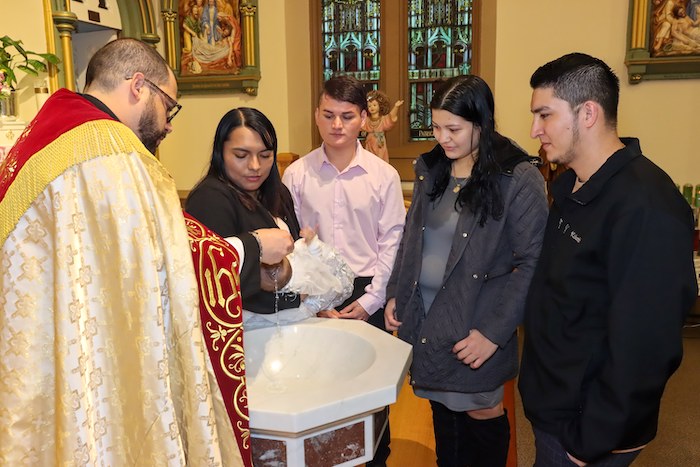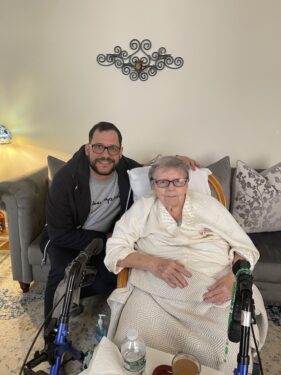
This is the second in a series of four profiles introducing the men who are set to be ordained as priests for the Diocese of Brooklyn on June 3 at the Co-Cathedral of St. Joseph in Prospect Heights.
WESTON, Mass. — Ernesto Alonso, a native of Havana, knew as a child he would join the Catholic clergy, but first he had to discern whether to become a permanent deacon or a priest.
As a deacon, he would need a profession outside the church. So he became a personal chef for Jewish families in New York City, specializing in kosher cuisine.
He did become a deacon, but not a permanent one. Rather, he is now a transitional deacon who will be ordained Saturday, June 3 — one of four new priests in the Diocese of Brooklyn. June 3 is the date for his ordination to the priesthood with three other transitional deacons. They are Deacons Samuel Mwiwawi, Nnamdi Eusebius Eze, and Thimote Cherelus.
“I’m not saying a deacon is less of a vocation,” he said. “It is a different way of serving the people of God. But this one, the priesthood — it is in my heart. I am so happy.”
An Early Missionary
Deacon Alonso, 45, has been preparing for his vocation at the Pope St. John XXIII National Seminary in Weston, Massachusetts, which helps candidates ages 30 and older pursue “second-career” or “delayed” vocations.
When Deacon Alonso was born in 1978, religions in Cuba had been under the rigid control of communism for nearly 20 years. Fidel Castro’s government took control in 1959; in 1961, an estimated 130 Catholic priests were evicted, leaving only a few dozen to continue catechesis.
Restrictions gradually loosened in 10-year increments. By 1986, Cuban Catholics organized to reach the unchurched, despite government hostility. The grassroots Cuban National Ecclesial Meeting (ENEC) chartered a way forward for Catholic evangelism in Cuba.
Then in 1998, Pope John Paul II toured Cuba at Castro’s invitation. Historians have speculated the dictator orchestrated the visit for propaganda purposes, but the people welcomed the pontiff with immense fanfare.
“Remember, the Church in Cuba was almost like a secret,” Deacon Alonso said. “Then, after Pope John Paul II’s visit it opened up a little bit more to celebrate the faith more publicly.”
As a young adult, Deacon Alonso became a missionary in rural areas, armed with knowledge he learned from Vincentian priests while studying philosophy at a minor seminary in Cuba.
“It was a big thing in my life,” he recalled. “Then I became a catechist and a lector — always serving in the Mass, being close to the priest. These are all things that helped form my vocation.”
Cooking Kosher
Deacon Alonso left Cuba in 2007 and came to Miami where his father had become a U.S. citizen. He was 29 and still discerning whether to be a permanent deacon or a priest.
“I worked in a restaurant as a waiter,” he said. “And I always loved cooking, so I decided to go to culinary school.” He earned an associate’s degree from Le Cordon Bleu College of Culinary Arts Miami.
“I was working in the same restaurant as a chef for eight years,” Deacon Alonso said. “The clientele that I met were mostly Jewish families who used to go down to Florida during the winter. They invited me to come to your country or come to New York, and I just made the move.”
He became a personal chef for the families. He visited different homes each day, prepared the menus, shopped for ingredients, and cooked the meals. Sometimes he made enough to store in containers for meals throughout the week.
“I learned how to cook kosher food for Jewish holidays,” the deacon said. “All of them knew I was Catholic, and sometimes they invited me to share with them around the table. I developed friendships with them. They believe in the same God that we believe. I mean, they are our fathers in faith, and their traditions are Scripture-based. It was an amazing experience.”

Serving Students and the Sick
Deacon Alonso settled in Astoria, where he became active in St. Joseph’s Parish as a catechist. He then became the director of religious education, which started him thinking about his priestly vocation again.
While in formation at the national seminary in Westin, Deacon Alonso has worked summers at parishes in the Diocese of Brooklyn, including Saints Simon and Jude Parish in far southwest Brooklyn, working with the pastor, Father John Maduri.
He also helped out at Immaculate Conception Parish in Astoria with Msgr. Fernando Ferrarese, the pastor. Closer to the seminary, he has worked at Most Holy Redeemer Parish in East Boston.
Deacon Alonso said he loves teaching students of all ages and he hopes his first assignment in the diocese will involve education, possibly at a Catholic academy.
He also loves ministering to the homebound. Daily visits to the sick became a regular routine for him at Immaculate Conception, and he hopes to build on that ministry as a priest.
“There are a lot of good people that were very active in parishes,” he said. “They were leaders, catechists, missionaries, and now they are homebound. But bringing Communion to them is like the Church going to them. You are bringing Jesus to them in the Eucharist.”

Ernesto Alonso will be a wonderful priest. How fitting that his profession was as a chef. As a priest he will be serving the most special and valued meal of all and we will all be his guests as he brings down Christ in the Eucharist to us from the altar. You can’t have a better meal than that for our body and soul. Also how beautiful that he sees the value of our homebound. They need to see how important they still are to all communities and we have so much to learn from them. Their lives are not over just changed.
He will make an awesome priest.